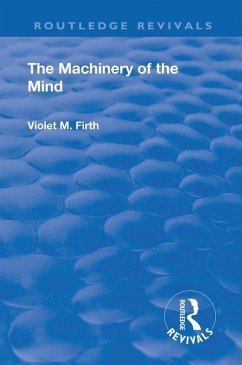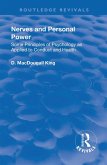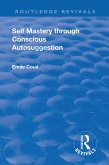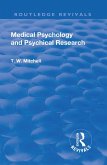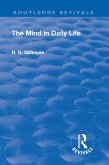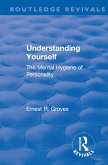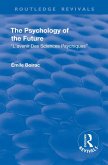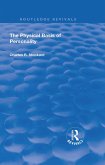Violet Mary Firth
Revival: The Machinery of the Mind (1922) (eBook, PDF)
42,95 €
42,95 €
inkl. MwSt.
Sofort per Download lieferbar

21 °P sammeln
42,95 €
Als Download kaufen

42,95 €
inkl. MwSt.
Sofort per Download lieferbar

21 °P sammeln
Jetzt verschenken
Alle Infos zum eBook verschenken
42,95 €
inkl. MwSt.
Sofort per Download lieferbar
Alle Infos zum eBook verschenken

21 °P sammeln
Violet Mary Firth
Revival: The Machinery of the Mind (1922) (eBook, PDF)
- Format: PDF
- Merkliste
- Auf die Merkliste
- Bewerten Bewerten
- Teilen
- Produkt teilen
- Produkterinnerung
- Produkterinnerung

Bitte loggen Sie sich zunächst in Ihr Kundenkonto ein oder registrieren Sie sich bei
bücher.de, um das eBook-Abo tolino select nutzen zu können.
Hier können Sie sich einloggen
Hier können Sie sich einloggen
Sie sind bereits eingeloggt. Klicken Sie auf 2. tolino select Abo, um fortzufahren.

Bitte loggen Sie sich zunächst in Ihr Kundenkonto ein oder registrieren Sie sich bei bücher.de, um das eBook-Abo tolino select nutzen zu können.
This book is one of the shortest and clearest of the many popular books upon modern psychology which have been published. The beginner would find this book, with its clear explanations of technical terms, a useful companion to more advanced treatises.
- Geräte: PC
- mit Kopierschutz
- eBook Hilfe
- Größe: 1.35MB
Andere Kunden interessierten sich auch für
![Revival: Nerves and Personal Power (1922) (eBook, PDF) Revival: Nerves and Personal Power (1922) (eBook, PDF)]() D. Macdougall KingRevival: Nerves and Personal Power (1922) (eBook, PDF)65,95 €
D. Macdougall KingRevival: Nerves and Personal Power (1922) (eBook, PDF)65,95 €![Revival: Self Mastery Through Conscious Autosuggestion (1922) (eBook, PDF) Revival: Self Mastery Through Conscious Autosuggestion (1922) (eBook, PDF)]() Emile CoueRevival: Self Mastery Through Conscious Autosuggestion (1922) (eBook, PDF)41,95 €
Emile CoueRevival: Self Mastery Through Conscious Autosuggestion (1922) (eBook, PDF)41,95 €![Revival: Medical Psychology and Psychical Research (1922) (eBook, PDF) Revival: Medical Psychology and Psychical Research (1922) (eBook, PDF)]() Thomas Walker MitchellRevival: Medical Psychology and Psychical Research (1922) (eBook, PDF)54,95 €
Thomas Walker MitchellRevival: Medical Psychology and Psychical Research (1922) (eBook, PDF)54,95 €![Revival: The Mind In Daily Life (1933) (eBook, PDF) Revival: The Mind In Daily Life (1933) (eBook, PDF)]() R. D. GillespieRevival: The Mind In Daily Life (1933) (eBook, PDF)54,95 €
R. D. GillespieRevival: The Mind In Daily Life (1933) (eBook, PDF)54,95 €![Revival: Understanding Yourself: The Mental Hygiene of Personality (1935) (eBook, PDF) Revival: Understanding Yourself: The Mental Hygiene of Personality (1935) (eBook, PDF)]() Ernest GrovesRevival: Understanding Yourself: The Mental Hygiene of Personality (1935) (eBook, PDF)54,95 €
Ernest GrovesRevival: Understanding Yourself: The Mental Hygiene of Personality (1935) (eBook, PDF)54,95 €![Revival: The Psychology of the Future (1918) (eBook, PDF) Revival: The Psychology of the Future (1918) (eBook, PDF)]() Émile BoiracRevival: The Psychology of the Future (1918) (eBook, PDF)65,95 €
Émile BoiracRevival: The Psychology of the Future (1918) (eBook, PDF)65,95 €![Revival: The Physical Basis of Personality (1931) (eBook, PDF) Revival: The Physical Basis of Personality (1931) (eBook, PDF)]() Charles Rupert StockardRevival: The Physical Basis of Personality (1931) (eBook, PDF)60,95 €
Charles Rupert StockardRevival: The Physical Basis of Personality (1931) (eBook, PDF)60,95 €-
-
-
This book is one of the shortest and clearest of the many popular books upon modern psychology which have been published. The beginner would find this book, with its clear explanations of technical terms, a useful companion to more advanced treatises.
Dieser Download kann aus rechtlichen Gründen nur mit Rechnungsadresse in A, B, BG, CY, CZ, D, DK, EW, E, FIN, F, GR, HR, H, IRL, I, LT, L, LR, M, NL, PL, P, R, S, SLO, SK ausgeliefert werden.
Produktdetails
- Produktdetails
- Verlag: Taylor & Francis eBooks
- Seitenzahl: 95
- Erscheinungstermin: 16. Januar 2018
- Englisch
- ISBN-13: 9781351338264
- Artikelnr.: 50920021
- Verlag: Taylor & Francis eBooks
- Seitenzahl: 95
- Erscheinungstermin: 16. Januar 2018
- Englisch
- ISBN-13: 9781351338264
- Artikelnr.: 50920021
- Herstellerkennzeichnung Die Herstellerinformationen sind derzeit nicht verfügbar.
Dion Fortune (born Violet Mary Firth, 6 December 1890 - 6 January 1946) was a British occultist, Christian Qabalist, ceremonial magician, novelist and author. She was a co-founder of the Fraternity of the Inner Light, an occult organisation that promoted philosophies which she claimed had been taught to her by spiritual entities known as the Ascended Masters. A prolific writer, she produced a large number of articles and books on her occult ideas and also authored seven novels, several of which expound occult themes.
Fortune was born in Llandudno, North Wales, to a wealthy upper middle-class English family, although little is known of her early life. By her teenage years she was living in England's West Country, where she wrote two books of poetry. After time spent at a horticultural college she began studying psychology and psychoanalysis at the University of London before working as a counsellor in a psychotherapy clinic. During the First World War she joined the Women's Land Army and established a company selling soy milk products. She became interested in esotericism through the teachings of the Theosophical Society, before joining an occult lodge led by Theodore Moriarty and then the Alpha et Omega occult organisation.
She came to believe that she was being contacted by the Ascended Masters, including "the Master Jesus", and underwent trance mediumship to channel the Masters' messages. In 1922 Fortune and Charles Loveday claimed that during one of these ceremonies they were contacted by Masters who provided them with a text, The Cosmic Doctrine. Although she became the president of the Christian Mystic Lodge of the Theosophical Society, she believed the society to be uninterested in Christianity, and split from it to form the Community of the Inner Light, a group later renamed the Fraternity of the Inner Light. With Loveday she established bases in both Glastonbury and Bayswater, London, began issuing a magazine, gave public lectures, and promoted the growth of their society. During the Second World War she organised a project of meditations and visualisations designed to protect Britain. She began planning for what she believed was a coming post-war Age of Aquarius, although she died of leukemia shortly after the war's end.
Fortune is recognised as one of the most significant occultists and ceremonial magicians of the early 20th century. The Fraternity she founded survived her and in later decades spawned a variety of related groups based upon her teachings. Her novels in particular proved an influence on later occult and modern Pagan groups such as Wicca.
-------
Sir Arthur George Tansley FLS, FRS (15 August 1871 - 25 November 1955) was an English botanist and a pioneer in the science of ecology. Educated at Highgate School, University College London and Trinity College, Cambridge, Tansley taught at these universities and at Oxford, where he served as Sherardian Professor of Botany until his retirement in 1937. He found the New Phytologist in 1902 and served as its editor until 1931. Tansley was a pioneer of the science of ecology in Britain, being heavily influenced by the work of Danish botanist Eugenius Warming, and introduced the concept of the ecosystem into biology.
Tansley was a founding member of the first professional society of ecologists, the Central Committee for the Survey and Study of British Vegetation, which later organised the British Ecological Society, and served as its first president and founding editor of the Journal of Ecology. Tansley also served as the first chairman of the British Nature Conservancy. Tansley was elected a Fellow of the Royal Society in 1915, and knighted in 1950. The New Phytologist publishes regular Tansley Reviews, while the New Phytologist Trust awards a Tansley Medal, both named in his honour.
Fortune was born in Llandudno, North Wales, to a wealthy upper middle-class English family, although little is known of her early life. By her teenage years she was living in England's West Country, where she wrote two books of poetry. After time spent at a horticultural college she began studying psychology and psychoanalysis at the University of London before working as a counsellor in a psychotherapy clinic. During the First World War she joined the Women's Land Army and established a company selling soy milk products. She became interested in esotericism through the teachings of the Theosophical Society, before joining an occult lodge led by Theodore Moriarty and then the Alpha et Omega occult organisation.
She came to believe that she was being contacted by the Ascended Masters, including "the Master Jesus", and underwent trance mediumship to channel the Masters' messages. In 1922 Fortune and Charles Loveday claimed that during one of these ceremonies they were contacted by Masters who provided them with a text, The Cosmic Doctrine. Although she became the president of the Christian Mystic Lodge of the Theosophical Society, she believed the society to be uninterested in Christianity, and split from it to form the Community of the Inner Light, a group later renamed the Fraternity of the Inner Light. With Loveday she established bases in both Glastonbury and Bayswater, London, began issuing a magazine, gave public lectures, and promoted the growth of their society. During the Second World War she organised a project of meditations and visualisations designed to protect Britain. She began planning for what she believed was a coming post-war Age of Aquarius, although she died of leukemia shortly after the war's end.
Fortune is recognised as one of the most significant occultists and ceremonial magicians of the early 20th century. The Fraternity she founded survived her and in later decades spawned a variety of related groups based upon her teachings. Her novels in particular proved an influence on later occult and modern Pagan groups such as Wicca.
-------
Sir Arthur George Tansley FLS, FRS (15 August 1871 - 25 November 1955) was an English botanist and a pioneer in the science of ecology. Educated at Highgate School, University College London and Trinity College, Cambridge, Tansley taught at these universities and at Oxford, where he served as Sherardian Professor of Botany until his retirement in 1937. He found the New Phytologist in 1902 and served as its editor until 1931. Tansley was a pioneer of the science of ecology in Britain, being heavily influenced by the work of Danish botanist Eugenius Warming, and introduced the concept of the ecosystem into biology.
Tansley was a founding member of the first professional society of ecologists, the Central Committee for the Survey and Study of British Vegetation, which later organised the British Ecological Society, and served as its first president and founding editor of the Journal of Ecology. Tansley also served as the first chairman of the British Nature Conservancy. Tansley was elected a Fellow of the Royal Society in 1915, and knighted in 1950. The New Phytologist publishes regular Tansley Reviews, while the New Phytologist Trust awards a Tansley Medal, both named in his honour.
